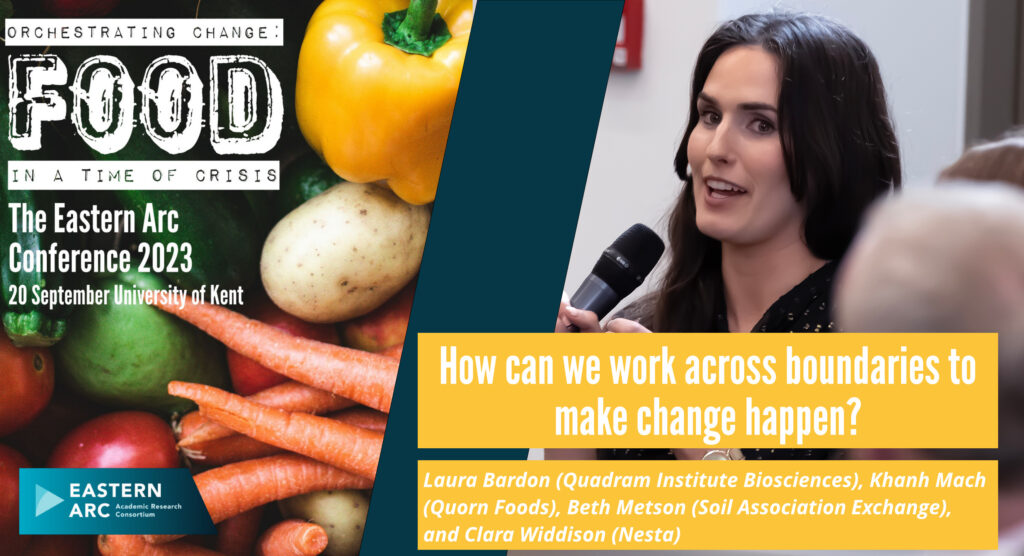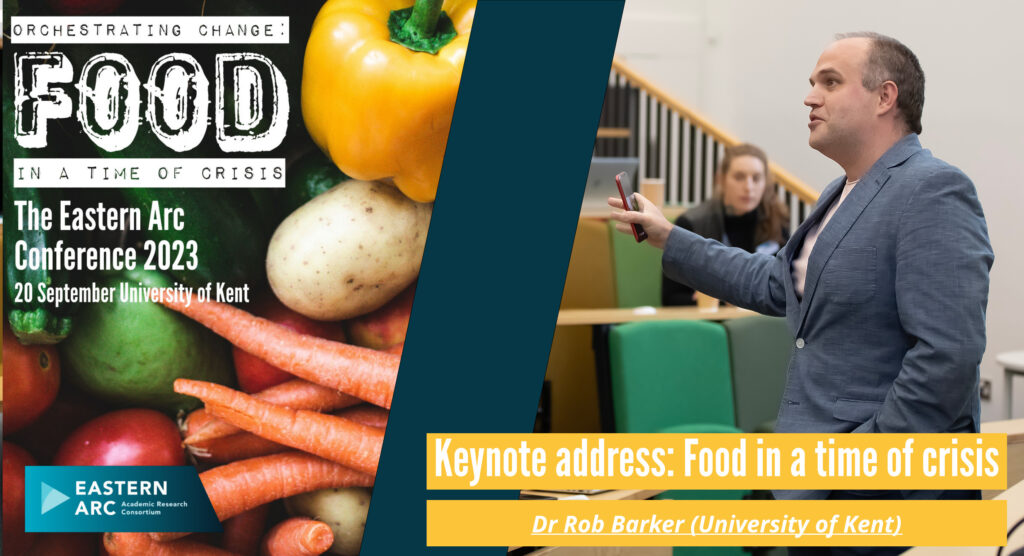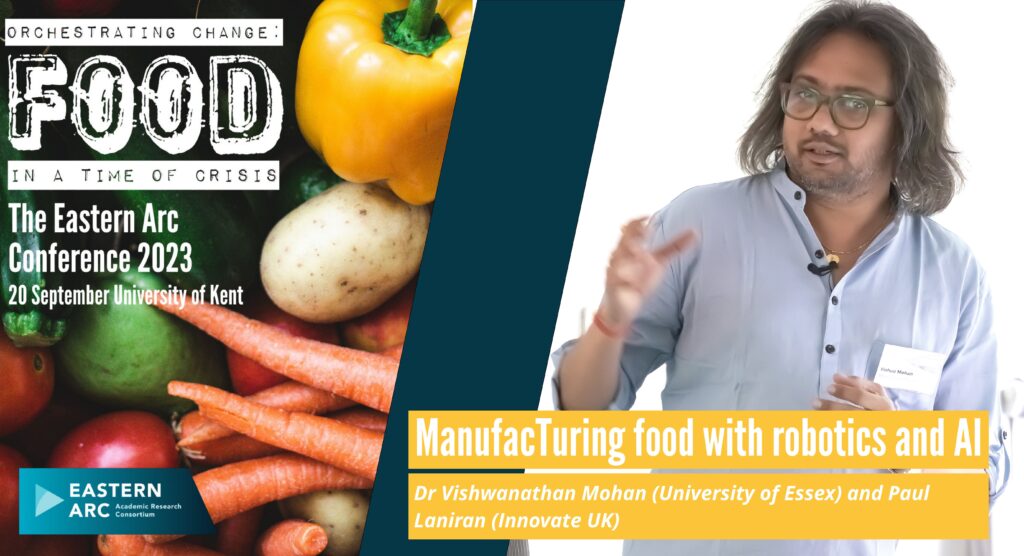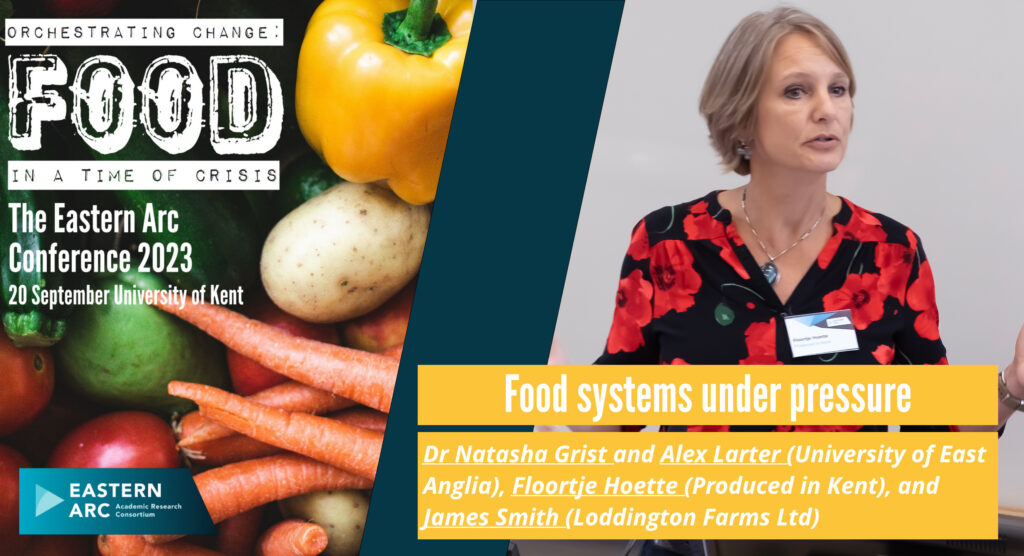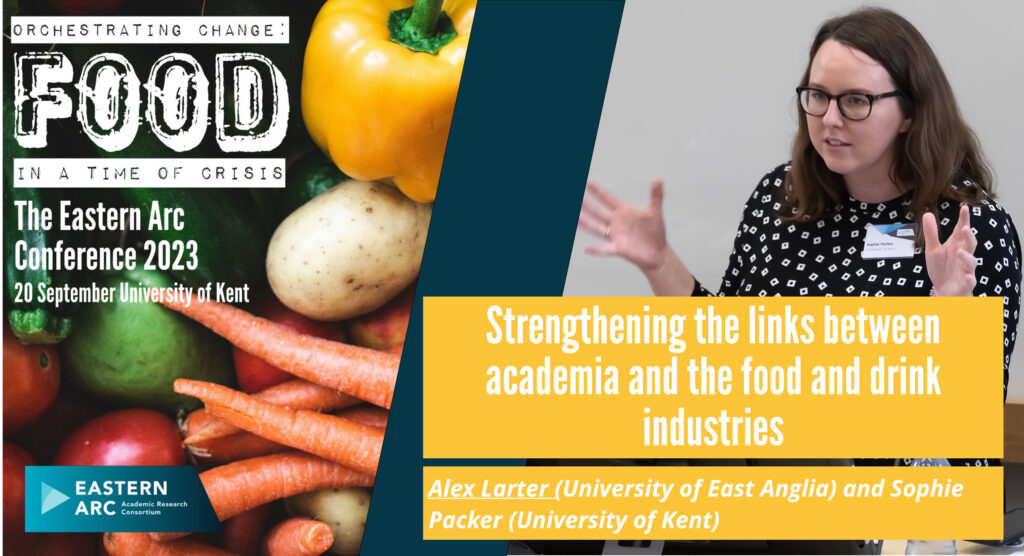‘Food in a time of crisis’: Resources from the EARC Conference 2023
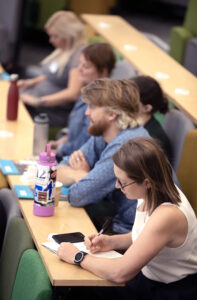 Our conference in 2023 looked at food in a time of crisis.
Our conference in 2023 looked at food in a time of crisis.
Our food system is increasingly dysfunctional. Events such as the pandemic and the Ukrainian war have demonstrated how fragile it is, with production and supply disrupted and costs spiralling.
When food is available, there is a fierce debate about the nutritional benefits of processed products, the long-term impacts on population health, and even the morality and sustainability of dietary choices.
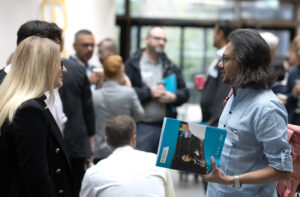 Our conference this year was a chance to debate these issues. Bringing together academics, researchers, businesses, policy-makers, charities and other organisations, it was an opportunity to explore the issues, make connections and start to work together to identify solutions to the current crisis we’re in.
Our conference this year was a chance to debate these issues. Bringing together academics, researchers, businesses, policy-makers, charities and other organisations, it was an opportunity to explore the issues, make connections and start to work together to identify solutions to the current crisis we’re in.
To catch up with the presentations and discussions on the day, click on the sessions below, or browse the photos and recordings via the links on the right.
-
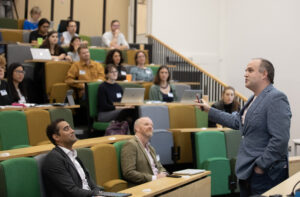
Dr Rob Barker (University of Kent)
The current food system is like a discordant orchestra. Each instrument is working to its own beat, playing its own tune, and the result is unlistenable. The producers and suppliers complain about the processors and manufacturers, the manufacturers about the retailers. Distributors complain about the Government. The consumers complain about them all – and understandably so. They are the ones who have to put food on the tables of their families.
Of course, this is partly down to a perfect storm of recent events. Brexit, the pandemic and the war in Ukraine have all put pressure on the system, whilst the bigger issue of the climate crisis has added an existential urgency to finding solutions. But there are also dysfunctional relationships within the food system that have evolved over time, and these are being stretched by the political challenges in the wider world.
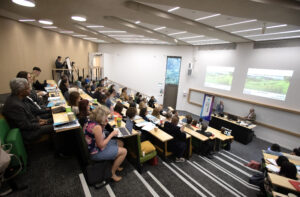 There is a pressing need for change, but is it possible? Dr Rob Barker has long been an advocate and agent for change. As such he was able to step in, with less than 18 hours to prepare, to give the conference the provocation it needed, and offering an inspiring vision of hope that set the compass for the day.
There is a pressing need for change, but is it possible? Dr Rob Barker has long been an advocate and agent for change. As such he was able to step in, with less than 18 hours to prepare, to give the conference the provocation it needed, and offering an inspiring vision of hope that set the compass for the day.He demonstrated how universities can play a crucial role in working with stakeholders, including producers, manufacturers and consumers, as well their students, to develop the solutions that will help the orchestra to work in harmony again.
-
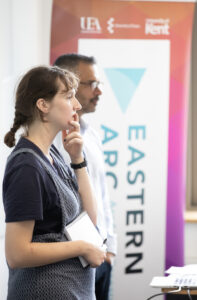 Dr Philip Pothen (University of Kent) and Tilde Ferree (Food Foundation)
Dr Philip Pothen (University of Kent) and Tilde Ferree (Food Foundation)The country is facing a cost of living crisis that is, at least in part, the result of a food system that many argue is unsustainable, unaffordable and unfair. What can universities do about this, both in the short term and the long term? What partnerships do we need to build, internally and externally, to bring about real and lasting change?
In this workshop participants explored what it means to be a Right to Food University, the challenges and the opportunities this initiative brings and how it can support and deepen a university’s civic mission and commitment to social purpose.
They also explored the potential of an Eastern Arc Right to Food network that could help take forward these missions collaboratively, bring together expertise across our three universities, and pool knowledge and insight to help overcome the challenges of a food system in crisis.
Slides from the session are available here (ppt).
-
Dr Vishwanathan Mohan (University of Essex) and Paul Laniran (Innovate UK)
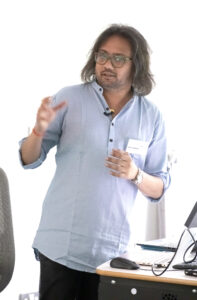 Changing demographics (ageing population, labour availability for ‘repetitive, manual’ jobs in the farm), economics (production cost, demand, and imports), environmental sustainability (reducing wastage, pesticide use, Net-Zero) is placing tremendous pressure on the agri-food sector, opening up significant opportunities for innovations in growing methods embedded with cutting edge robotics/AI in the underlying harvesting workflows.
Changing demographics (ageing population, labour availability for ‘repetitive, manual’ jobs in the farm), economics (production cost, demand, and imports), environmental sustainability (reducing wastage, pesticide use, Net-Zero) is placing tremendous pressure on the agri-food sector, opening up significant opportunities for innovations in growing methods embedded with cutting edge robotics/AI in the underlying harvesting workflows.The session featured invited speaker Paul Laniran (Innovation Lead, Transforming Food Production Programme, Innovate UK) who presened the recent funding schemes for businesses/universities in Agri-food area like the flagship Farming Innovation Pathways programme.
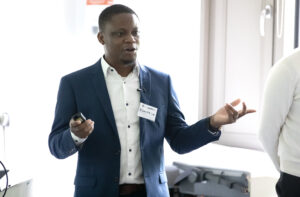 Dr Vishuu Mohan summarized recent research on soft fruit picking, salad crop harvesting, mushroom picking using a range of robots in innovative growing environments. The session also heard from a grower/AI-robotics start up.
Dr Vishuu Mohan summarized recent research on soft fruit picking, salad crop harvesting, mushroom picking using a range of robots in innovative growing environments. The session also heard from a grower/AI-robotics start up.This breakout session facilitated interdisciplinary discussion on harnessing the power of cutting edge robotics/AI to solve challenges faced by agri-food sector, and developed new collaborations/joint projects.
-
Dr Natasha Grist and Alex Larter (University of East Anglia), Floortje Hoette (Produced in Kent), and James Smith (Loddington Farms Ltd)
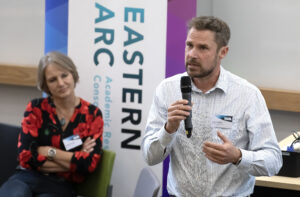 East Anglia and Kent’s food systems have long been important producers of vegetables, grain, sugar, fruit and arable crops, and their processed edible goods. Historically, these regions have led huge technological and social changes in farming and production.
East Anglia and Kent’s food systems have long been important producers of vegetables, grain, sugar, fruit and arable crops, and their processed edible goods. Historically, these regions have led huge technological and social changes in farming and production.But there are now wider calls to transform UK food production into an environmentally sustainable, net zero emission sector. And amidst unprecedented external challenges to energy, input and labour supply and costs and market access, the regions’ food systems are now in huge flux and are under future threat. Innovations and forward-thinking solutions are being created at different scales along the food system. In this session speakers and participants looked closely at these challenges and think through ways to support solutions.
 Speakers from industry and academia tackled two of the thorny issues arising in our food systems: whether UK supermarkets can be ‘forces for good’ towards fairly produced and sustainable food; and how local produce can be made more sustainable and affordable.
Speakers from industry and academia tackled two of the thorny issues arising in our food systems: whether UK supermarkets can be ‘forces for good’ towards fairly produced and sustainable food; and how local produce can be made more sustainable and affordable.The speakers reflected on these, the roles of champions and effective ways for cooperation and collaboration that could prove useful for East Anglia and Kent and as lessons for the wider UK over the next ten years.
Slides from the session are available here (pdf).
-
Dr Lavinia Bertini (Brighton and Sussex Medical School) and Dr Stacey Rand (University of Kent)
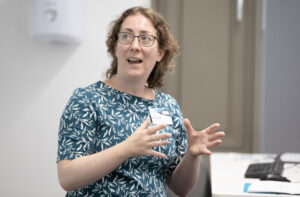 There are an estimated 1.3m people in the UK, aged 65 or over, at risk of malnutrition. This is a major cause of health deterioration and mortality among older people. It is associated with a range of complex interrelated factors, including limited mobility or dexterity, cognitive impairment, social isolation, inaccessibility of shops and food outlets, lack of transport, and low or fixed incomes.
There are an estimated 1.3m people in the UK, aged 65 or over, at risk of malnutrition. This is a major cause of health deterioration and mortality among older people. It is associated with a range of complex interrelated factors, including limited mobility or dexterity, cognitive impairment, social isolation, inaccessibility of shops and food outlets, lack of transport, and low or fixed incomes.Community-based social care, especially homecare services, can play an important role in sustaining the health and wellbeing of older people living at home. They can help with the basic tasks of managing nutrition and hydration, but also the personal, social and cultural aspects of food and drink. However, there has been relatively little research into the food and drink-related needs of older adults who use homecare or other community services. In an ongoing study, the speakers had undertaken a scoping literature review to identify the existing evidence and gaps for future research. They had also analysed a national dataset of the food and drink needs of older adults using community-based social care services in England.
In this workshop the speakers shared preliminary findings from this study. In doing so, they invited engagement and discussion of some of the challenges of how to frame, engage and communicate topics related to food and care, which involves practices and barriers to food that may not typically be considered (e.g. the need for support to eat/drink) in discourse about food.
Slides from the session are available here (pptx).
-
Dr Jordon Lazell and Dr Debashree De (University of Essex), Maz Aspillaga and Ben Mann (Essex County Council); Alison Losdiska and John Hailes (Laindon Community Supermarket)
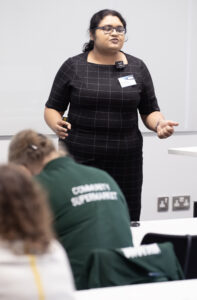 Community organisations play a critical role in alleviating food poverty and food insecurity in the UK. This session focusds on the work of charitable food supply chains and the redistribution of food surpluses that provides a lifeline of accessible food supply. It explored this sector’s need for greater resilience with regards to key learnings from the pandemic and the ongoing impact of the cost of living crisis.
Community organisations play a critical role in alleviating food poverty and food insecurity in the UK. This session focusds on the work of charitable food supply chains and the redistribution of food surpluses that provides a lifeline of accessible food supply. It explored this sector’s need for greater resilience with regards to key learnings from the pandemic and the ongoing impact of the cost of living crisis.There has been a considerable lack of academic engagement in understanding activities of capturing, storing, sorting, processing and redistributing such surplus food (i.e. food products from the retail and manufacturing sector that are no longer required but are still perfectly edible).
In this session the speakers presented the findings of a recent study looking into the concept of resilience by stakeholders across this supply chain, as well as allowing time to discuss questions such as how to progress towards greater resilience, what structural and societal changes need to take place, and wider concerns such as how to access appropriate knowledge and skills, and how organisations can learn from each other.
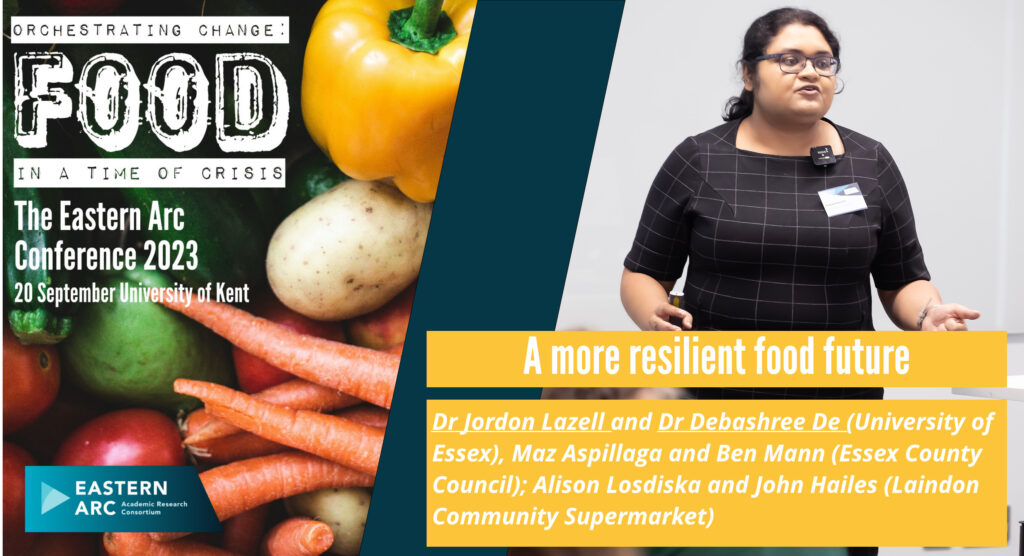
-
Alex Larter (University of East Anglia) and Sophie Packer (University of Kent)
T
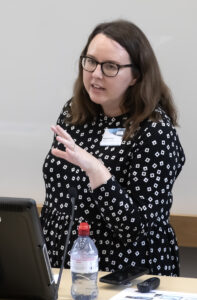 o meet the increasing demands in the UK’s food & drink sector, businesses must explore collaborations with partners focused on research, development, and innovation (RD&I).
o meet the increasing demands in the UK’s food & drink sector, businesses must explore collaborations with partners focused on research, development, and innovation (RD&I). Academic institutions have actively worked both independently and in cooperation with the industry to enhance and introduce newer sustainable food and drink products.
In this session, delegates heard from Alexander Larter (Food Innovation Cluster Manager at the University of East Anglia), Sophie Packer (Innovation Growth Manager at Growing Kent and Medway), and food & drink businesses who shared insights on successful collaborations between academia and industry to overcome challenges.
Slides from the session are available below:
- Session 6 – Larter (pptx)
- Session 6 – Packer (pdf)
-
Dr Silvio Caputo and Dr William Rowlandson (University of Kent)
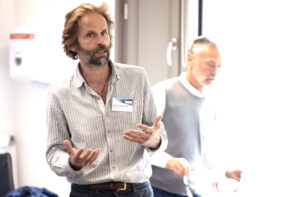 The session explored different approaches to urban agriculture, and looked at how it can be used to develop resilience. It documented how it has been used to tackle situations including the Covid-19 pandemic, food insecurity currently experienced by many households; horticulture and mental health; and extreme historical events such as the 1960 Cuban crisis.
The session explored different approaches to urban agriculture, and looked at how it can be used to develop resilience. It documented how it has been used to tackle situations including the Covid-19 pandemic, food insecurity currently experienced by many households; horticulture and mental health; and extreme historical events such as the 1960 Cuban crisis.The session also includeed presentations on the importance of quantifying outputs to produce real evidence of the impact of urban agriculture in alleviating crises.
Slides from the session are available below:
- Session 7 – Caputo (pdf)
- Session 7 – Gillick Farrell (pdf)
- Session 7 – Schoen (pptx)
- Session 7 – Mason (to follow)
-
Dr Jordan Savage (University of Essex)
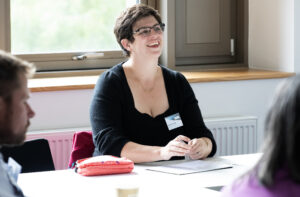 The aim of this creative writing workshop was to think about how the sensory experience of food creates a shared space: a way of understanding one another’s stories, however different they might be. Participants looked at three passages from American novelist Willa Cather’s My Ántonia, in which food is used to explore different migrant cultures on the frontier in the USA.
The aim of this creative writing workshop was to think about how the sensory experience of food creates a shared space: a way of understanding one another’s stories, however different they might be. Participants looked at three passages from American novelist Willa Cather’s My Ántonia, in which food is used to explore different migrant cultures on the frontier in the USA.Thinking about migration, nostalgia, and home, they discussed connections between their own identities and food narratives, and used these to do some creative writing, which could be fiction or memoir, shared or kept private.
-
Laura Bardon (Quadram Institute Biosciences), Khanh Mach (Quorn Foods), Beth Metson (Soil Association Exchange), and Clara Widdison (Nesta)
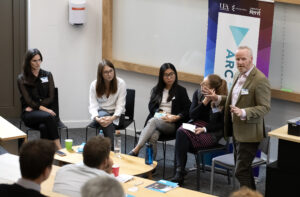 The conference began th a provocation: our food system is in a state of crisis, and it will require a significant ‘orchestration’ to address it. The sessions that followed examined different elements of the crisis, and the initiatives that have been launched to overcome these.
The conference began th a provocation: our food system is in a state of crisis, and it will require a significant ‘orchestration’ to address it. The sessions that followed examined different elements of the crisis, and the initiatives that have been launched to overcome these.The final plenary drew together these threads and looked at where we go from here. Can we make wholesale change happen? Can we engage producers, manufacturers, retailers and consumers, as well as government and policymakers, to work together to transition the system to a more sustainable and beneficial footing?
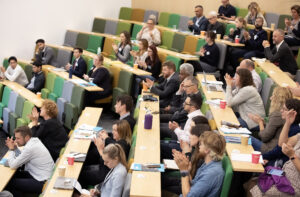 The speakers brought significant and diverse experience and knowledge to the discussion. Representing different stages of the food chain and different perspectives from it, the starting point for their discussion was a fundamental one: how do we ensure that consumers have access to a nutritious, healthy and sustainable diet?
The speakers brought significant and diverse experience and knowledge to the discussion. Representing different stages of the food chain and different perspectives from it, the starting point for their discussion was a fundamental one: how do we ensure that consumers have access to a nutritious, healthy and sustainable diet?The session was an opportunity to look forward and understand what needs to be done – and what is being done – to trigger the seismic shift necessary to overcome our current crisis.
Dr Bardon’s slides from this session are available here (pptx)
